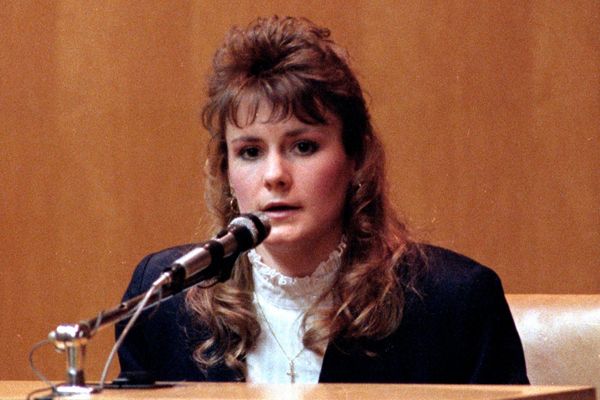
For 25 years, Larry David has boldly, repeatedly gone where no one else would dare. His fictionalised alter ego has besmirched the honour of an unsuccessful kamikaze pilot who survived the second world war until the man’s son tried to kill himself (“He grazed the ship!?! … Did he say: ‘Jesus, this kamikaze business might not be for me?’”). He has hosted a dinner party featuring a contestant on the reality show Survivor having an explosive row about hardship with an actual Holocaust survivor (Survivor contestant: “I couldn’t even work out!”). At one point, despite his social circle’s protests, he even ended up befriending a sex offender. It has been outrageously funny, so toe-curlingly awkward that it’s borderline painful, but never less than utterly unique, spellbindingly watchable TV.
And this weekend, it comes to an end. After a quarter of a century spent portraying the most amusing curmudgeon in TV history, David is ready to retire Larry once and for all with Curb Your Enthusiasm’s finale. It comes off the back of one of the show’s funniest seasons ever – in which David has variously tried to buy a racist statue off a Black employee after accidentally breaking someone else’s ornament (“I just have to replace it!” “So you already have one?”). Or knocked Academy Award-winning actor Troy Kotsur clean off his feet by driving a golf ball into his back, then flashed his testicles to escape the consequences. Will we see Larry doing jail time in the finale for having unwittingly violated a law about bringing water to voters waiting in line? We’ll have to wait and see – but it’s sure to be funny.
Back in 1999, it was a very different show. Curb launched with an hour-long special that David and director Robert B Weide approached as a microbudget indie, shot with cheap handheld videocameras and verité lighting.
“It was very rough around the edges, and that was fine, because that’s sort of the look we were going for,” Weide says of a show that saw Larry making up an illness for a nonexistent stepfather to get out of a standup special. “Everything was really on the fly. Nothing was planned until we got to location. We were totally figuring it out as we went.”
It was David’s attempt to pursue a new challenge after excusing himself from Seinfeld’s writing team. His plan: push the little absurdities of everyday etiquette until they explode into conflict. It’s meant that throughout the show’s 12 seasons, rather than scripting scenes himself, David preferred to gather capable improvisers, give them certain prompts for the content of a scene, and let the natural rhythms of conversation play themselves out. Many of the most quotable one-liners arose spontaneously within the moment.
“In the beginning, I had to get up to speed just to hop onboard!” recalls JB Smoove, a regular scene-stealer as Larry’s mooching houseguest turned roommate Leon. “Luckily for me, I had a background in improv and had worked in the fast-paced environment of Saturday Night Live. The show has a process, unique to itself. You are doing real-time, in-your-head writing. Curb presented the ultimate improv challenge to everyone who ever appeared on it.”
It also firmly eschewed sitcom staples such as characters undergoing growth or falling in love – opting instead for pure laughs. Indeed, the upcoming series finale is fittingly called No Lessons Learned. Throughout its duration, Curb has delighted in exploring our unspoken rules of etiquette: Is it better to toss or pass your keys to a valet? Exactly how many members of a restaurant’s staff should you tip? His love of the free liquorice given away at a car dealership forces him to spend $150,000 on a sports car he does not want. A dispute at a coffee shop leads to a season-long arc that sees Larry open his own rival “spite store” right next door. “It’s one of the few pure comedies on TV right now,” says Weide. “A viewer desires nothing more than to watch people they’re interested in doing funny things.”
One of the greatest strengths of the show is David’s outrageous version of himself. On Seinfeld, David had always used the character of George as a stand-in for himself, and didn’t want to repeat the trick. So rather than a hapless doofus, David made the fictionalised Larry a calamity-prone industry insider moving through a moneyed Orange County of laundromats, golf courses and doctors’ offices – and he is less similar to the real David than you might think.
“TV Larry has a pile of shit that he has to deal with and so does Real Larry, it’s just different shit!” says Smoove. “The Larry he plays on the show is very outspoken and obnoxious. The real Larry is much more reserved, but interesting as hell. Larry is a knowledgable history buff, and an incredible storyteller with a lot of great damn stories.”
The show’s creators soon realised that any taboo – racism, the Holocaust, incest, bestiality – could be safely teased so long as Larry ended up the butt of the joke. One of the true masterworks of 21st-century comedy, the episode Palestinian Chicken turned the conflict in Gaza into an LA turf war, with the sincerely indifferent Larry caught between his favourite lunch spot and peer pressure from his fellow Jews. Whether inadvertently teaching a gay child to sew a swastika or taking Michael J Fox’s Parkinson’s side-effects as a personal slight, he mined humour from his own small-mindedness and insensitivity – a willingness to laugh at himself that has proved essential to the show’s longevity.
It was also a draw for guest stars. Some dropped by to play cracked-mirror parodies of themselves. Salman Rushdie discussed all the tail he got after the Ayatollah called for a fatwa against him. Ricky Gervais passed through to pitilessly mock the “broad” laugh-tracking on Seinfeld. Other comedy stars blended right into the fabric of Curb, such as Bill Hader as three nearly identical Hungarians who insist they don’t know one another, or Fred Armisen as a disabled man blocking Larry’s way in a narrow corridor. When they needed actors to welcome Larry to paradise during a near-death experience, they got Sacha Baron Cohen and Dustin Hoffman. Inevitably, they found Larry so annoying that they threw him out of heaven.
“Everyone’s welcoming, and they’re a well-established, comfortable group,” says Tracey Ullman – who plays Irma Kostroski, a repellent councilwoman with a “strong sexual musk” that Larry woos to get out of a jam involving a local ordinance requiring fences around one’s pool, then can’t get rid of. “It was such a joy to be part of it. This is the end of a wonderful era.”
With none other than Bruce Springsteen dropping in for last week’s penultimate episode (only for Larry to give him Covid), the impressive lineup of visiting talent testifies to Curb’s stature in the TV history books. “His popularity in England makes this show one of the few comedies to earn that respect across the pond,” Ullman says. “Larry’s really been embraced.”
Improbably, the real David has begun to intrude upon mainstream culture. He inspired a weeklong viral news cycle for strangling the life out of Sesame Street’s Elmo on daytime television (David’s explanation: “He was going on about mental health and I had to listen to every word. I was going, ‘Oh, my God, I don’t think I can take another second of this!’ So I got off my chair, I approached him, and I throttled him!”). He’s been snapped by the paparazzi while lunching with Timothée Chalamet, and shouted out by such rappers as Tyler the Creator, Travis Scott and Drake. Most improbably of all, he’s emerged as a normcore fashion icon, his daily uniform of cotton tees, well-fitted blazers and unostentatious sneakers landing him a laudatory writeup in GQ (“Is there a more recognizable, self-assured, incredibly specific wardrobe to be found anywhere in pop culture?” it asked). As David brings Curb Your Enthusiasm to a grand conclusion, even diehard fans may wonder how this cantankerous bundle of neuroses has become an icon of his time.
“When he was starting, I thought he was brilliant,” Weide says of David’s early days – when he ground against a business that found him loud and annoying. “Audiences didn’t know what to make of his work back then, though. I remember thinking, ‘Boy, if the country ever catches up to this guy’s sense of humour, we’ll have riots in the streets.’ Later on, they’d sometimes ask if he could do anything to make Larry more likable, and he’d always go, ‘Ehhhhh, no.’”
He understood what every Curb viewer has come to understand: we cannot detest Larry any more than we detest the most embarrassing, flawed human parts of ourselves. David has often described the Larry character as his version of Superman, a hero who can do the things basic decency forbids him from doing in his own life – even if that’s just calling out queue-jumping and other minor social infractions.
“Larry’s secretly a lovely man,” Ullman says. “A show can’t go on this long without someone great at the top.” David’s is the comedy of admission – yes, other people’s children are insufferable, yes, Hamilton was overrated, yes, that guy over there is hogging the canapes. He serves our species’ essential need to gripe, providing a vital outlet for all the pent-up irritation that holds civilisation together by going unsaid. Like God, if Larry David did not exist, it would be necessary to invent him. As Weide sees it, Larry will attain eternal life in the hearts and minds of anybody who’s ever felt like yelling at someone for walking too slowly. “It’s just a silly show, and now it’s sort of in our DNA.”
* * *
Curb’s best episodes
Beloved Aunt
Season one, episode eight
The moment when Curb Your Enthusiasm first fully found its voice. Larry is tasked with writing an obituary for his wife’s aunt, which accidentally results in the filthiest misprint imaginable (you can probably work it out).
The Bare Midriff
Season seven, episode six
Curb has always delighted in nudging the boundaries of acceptability. Nowhere was that more evident than this, the episode where Larry accidentally urinates on a picture of christ. People subsequently mistake the urine for tears, and a bout of religious hysteria ensues.
The Table Read
Season seven, episode nine
The Seinfeld finale is one of the most divisive in history, so Larry David spent an entire season of Curb Your Enthusiasm trying to fix it. A Seinfeld reunion in all but name, the highlight of which was a Bob Einstein joke about a woman who packs her vagina with offal.
Palestinian Chicken
Season eight, episode three
One of Larry David’s favourite episodes, in which Larry is caught in the middle of two opposing sides. On one side: all of his Jewish friends. On the other: an antisemitic Palestinian woman who might want to have sex with him.
Fatwa!
Season nine, episode 10
Curb’s ninth season revolves around Larry’s attempt to stage a musical based on the fatwa issued against Salman Rushdie in the 1980s. The season finale opens with a number – performed by Lin-Manuel Miranda (as Rushdie) and F Murray Abraham (as the Ayatollah Khomeini) – that is so good you wish the musical existed for real.
Curb Your Enthusiasm’s finale episode airs in the UK on Sky Comedy on Mon 8th April.







